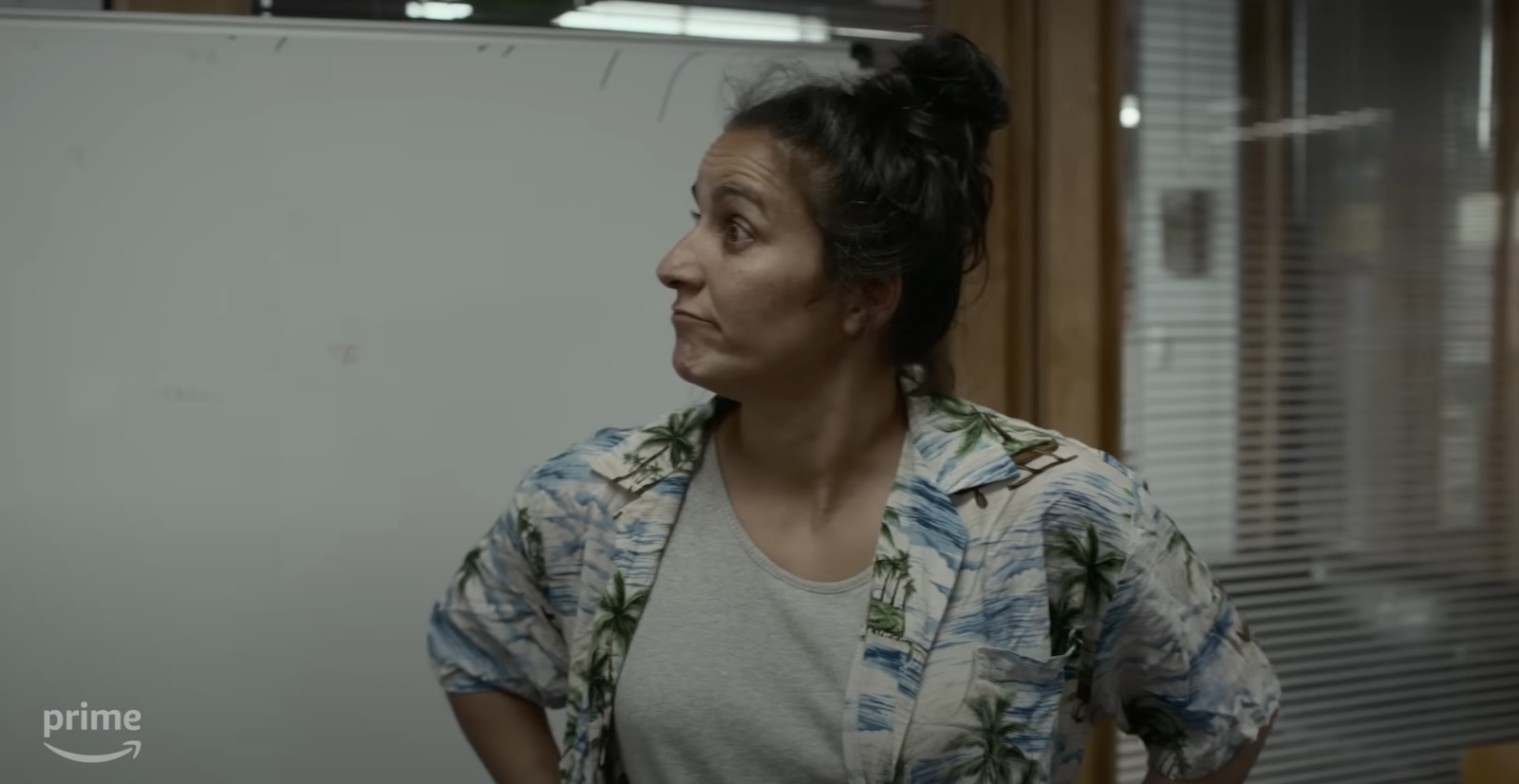I laughed the most at the exact same line the first and second time I watched Deadloch. It appears in the second episode of the Australian show that was for a long time known to its creators as “Funny Broadchurch.” Renegade detective Eddie Redcliffe (Madeleine Sami) has come down from Darwin to help solve the murder of a man who has washed up on the shore of the tiny but fully gentrifying (there’s a festival with longform performance art) Tasmanian town of Deadloch. Eddie is attending the victim’s wake in the local sports club when, while perusing a wall of memorial photographs, she sees a man she doesn’t recognize posing with his fishing rod. One of the dumbest guys in town—and it’s a town full of dumb guys, so that’s saying a lot—sidles up to her and Eddie points at the photo and asks: “Who’s this?”
His response: “That’s a fishing rod.”
Even just repeating it makes me laugh. Deadloch premiered on Amazon Prime last June, but I didn’t find it organically, my brother had to tell me about it. You would have expected it to be the other way around. Deadloch is perhaps the most lesbian television show that has ever existed, or at least the most lesbian show I have ever seen (and, yes, I have seen The L Word). It is about a town run by alpha lesbians in which the men—who range from grating liberal betas to reactionary “alphas”—start turning up dead. The eight-episode noiredy was created by “The Kates”—Kate McCartney and Kate McLennan—who got famous in their native Australia for their vicious spoofs of cooking shows and daytime TV. It was not a huge leap to spoof a crime series, except Deadloch is so much more than that.
This is as much a buddy cop show as it is a crime show, and actually, I barely remember the details of the case, but I very much remember the women who investigate it. There’s Dulcie Collins (Kate Box)—“sexy” to her obtrusively sunny, animal-loving, Tori Amos-yodeling wife (Alicia Gardiner)—the straight woman, who does her job as seriously as she can in a town full of unserious people. Then there’s Eddie, who, I’m going to be honest, is herself sexy as fuck. The reason this is worth pointing out is because Eddie does everything in her power to be absolutely repulsive. She is a dirtbag, or maybe it’s a fuckgirl. Whatever she is, the way she behaves is more in line with the worst man you have ever met, rather than the worst woman. Eddie recycles the same vest, stained Hawaiian shirt, and khakis every day and never changes her underwear, even when it’s discarded among crushed snacks on the floor (the mayor of the town, also a woman, describes Eddie’s smell as “old block of parmesan lost in a foot”). Thank God she wears a topknot, because there’s no way her hair would survive all that mid-sandwich talking, cunnilingus miming, and full-body belching.
It says something about Sami’s charisma that despite all of that (because of it?!?!) Eddie is incredibly hot. It’s clearly to do with her brazen, zero-fucks approach to everything. “I’m hungrier than a bum in a G-string,” she announces at one point. In full error, she sings “Psycho Killer” while holding up a photo of a guy she thinks is a suspect who turns up a victim instead. She bald-facedly calls the supercilious pathologist “an insufferable cunt” to his fiancée. She doesn’t really redeem herself until the end but she’s funny as fuck and like so many men with the same, uh, assets, it doesn’t matter—you’re there for the ride (so to speak). At least she doesn’t try to sleep with her partner.
To be clear, this show is not dumb, it’s in fact all the smarter for how dumb it comes across—all that vulgarity, all that odd-coupledom—while at its core is a tightly constructed multi-faceted (and satisfying) satire. (So, yeah, it’s also meta.) Maybe it’s common in Australia to have a show with a concept this ingenious which never gets boring and pays off with perfection, but if it is I want to know what’s in the water. In this case, apparently it’s a lot of “cunts” (that’s an Eddie joke if there ever was one—the next paragraph explains it, it’s a segue, relax).
In order to sell this very Aussie project to Amazon, a platform they chose for financial reasons, the Kates circulated something they call “The Cunt Manifesto,” written by Ben Chessell, who directed four episodes of the show. It was a document which basically acted as a cultural dictionary explaining all the ways they used the word “cunt” and all the ways that was OK because basically it had to be since “it fit in the rhythm of our writing,” according to McCartney in The Guardian. This Valerie Solanas-conjuring mandate is apt. Deadloch fits into a string of new comedy series out of Australia made by and centered on destabilized middle-aged women, from Fisk, in which co-creator Kitty Flanagan plays a polyester-suited (it looks like polyester anyway) lawyer who is resigned to being a small-time solicitor after her life falls apart, to Wellmania, in which a woman on the brink of 40 goes on a misguided wellness journey, to Frayed, in which creator Sarah Kendall plays a wealthy housewife who must return home to Australia after her dead husband leaves her bankrupt. All of these shows about struggling older women are equally, well, bizarre.
Australia has a knack for producing comedies even on film—I just rewatched The Adventures of Priscilla, Queen of the Desert, for one, though Muriel’s Wedding is another favorite—which rather than laundering their oddness, give it room to breathe (see Please Like Me and Colin from Accounts). Because of that, almost every comedy that they export reads at some level like a cult classic. In Deadloch, a widow sings a soulful rendition of “Lightning Crashes” at her husband’s funeral, a choir of lesbians sings a buoyant acapella version of “I Touch Myself” (this show has some great music), Eddie finds a new wardrobe at a store called Hunt 'N Gut, and a furry seal named Kevin terrorizes the community (there are also a lot of mentions of “tuna mornay,” which I had to look up—it’s Australia’s version of tuna bake).
I tried to figure out what makes Australia so good at preserving its straight-faced, profane self-mockery on screen. I figured it was something to do with being cut off from the rest of the world and becoming gloriously solipsistic. According to a local columnist named Ben Pobjie in The Sydney Morning Herald, that is kind of it. He traces the country’s on-screen lunacy to the beginning of the 1990s when a soap called Chances, about a lottery-winning family, tried to boost its ratings with weirdly outlandish plotlines involving everything from cannibal plants to Nazi sun goddesses (I don’t know—that show now has a cult following, obviously). Things only got weirder when off-script reality television came along to push the standards even further over the edge. Per Pobjie, “That’s the common thread in all of Australian TV’s weirdest moments: that sense that in this country, we make things up as we go along, and make the best of whatever disaster comes along.”
Perhaps my second favorite part of Deadloch comes right at the end, when the crime has been solved, and Eddie and Dulcie are embarking on another case—the death of Eddie’s last partner—suggesting a second season. It happens when Eddie introduces Dulcie as "Dulice," to which the latter, in shock, pulls her partner aside and says: “Do you not know my name????” Eight episodes in and even the main character still knows nothing. What a humbling Aussie note to end on.






